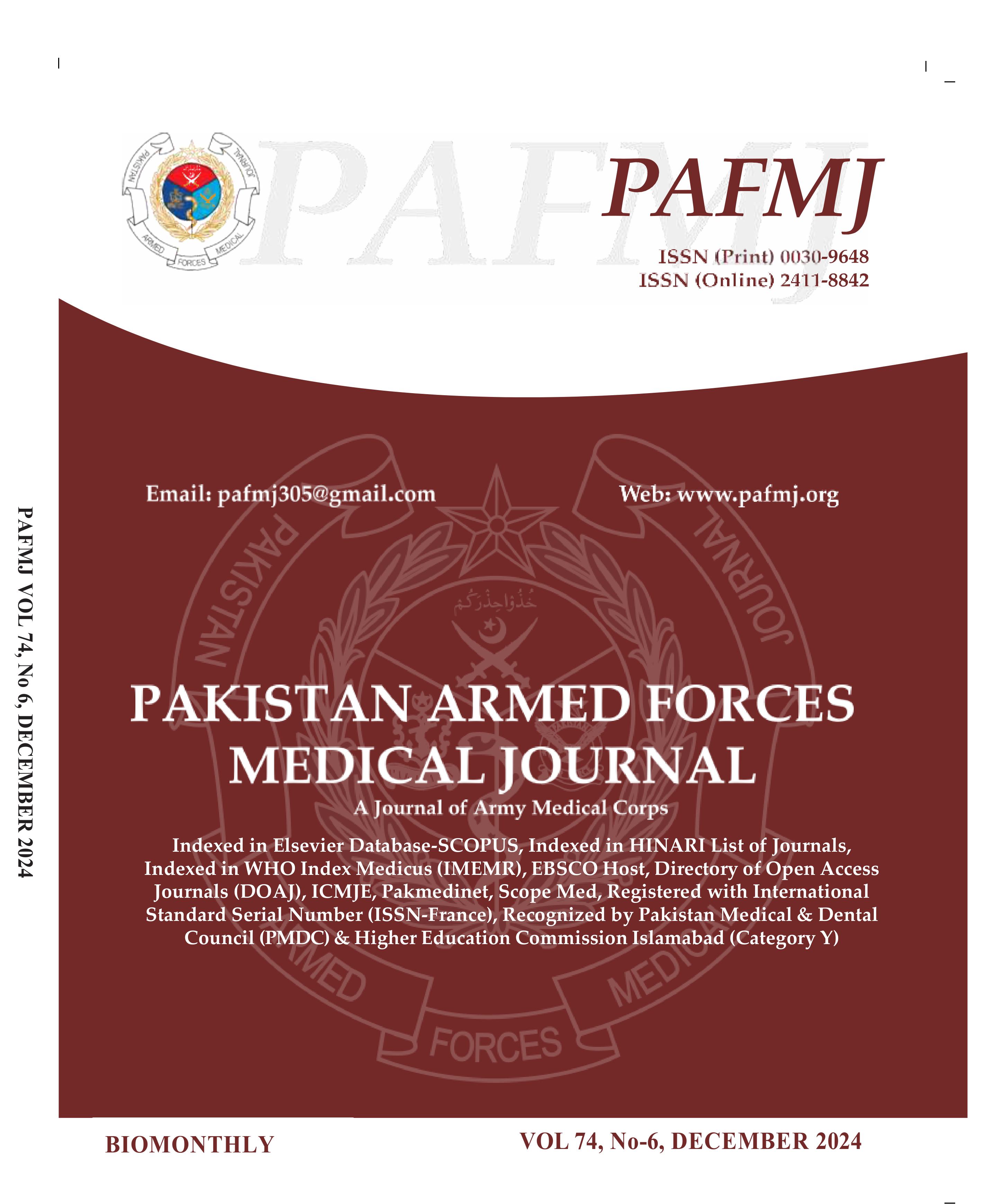Antracycline Induced Early Onset Chronic Cardiotoxicity in Cancer Patients
DOI:
https://doi.org/10.51253/pafmj.v74i2.6795Keywords:
Anthracycline, Cancer, CardiotoxicityAbstract
Objective: To assess the patients for early onset chronic cardiotoxicity who have been taking anthracyclines as part of their cancer treatment.
Study Design: Comparative cross-sectional study.
Place and Duration of Study: Oncology department, Combined Military Hospital, Rawalpindi Pakistan, from Dec 2020 to May 2021.
Methodology: One hundred patients with solid or hematological malignancies taking anthracyclines for more than three months and less than a year were included in the study. They underwent 2 dimensional echocardiography by consultant cardiac physician to look for cardiotoxicity. Cardiotoxicity was defined as left ventricular ejection fraction less than 60%. Age, gender, duration of anthracyclines use and presence of comorbid illness were correlated with presence of early onset chronic cardiotoxicity in our study participants.
Results: Out of 100 cancer patients using anthracyclines for more than three months and less than 12 months included in the study, 55(55%) were males while 45(45%) were females. Sixty-nine (69%) had ejection fraction more than 60% on echocardio-graphy while 31(31%) had <60%. Chi-square test revealed that presence of comorbidities (type 2 DM/ Hypertension) had statistically significant association with presence of cardiotoxicity in our study (p-value 0.002).
Conclusion: Cardiotoxicity emerged as a significant adverse effect related to anthracycline use among patients suffering from various types of malignant conditions. Patients with preexisting medical conditions like diabetes or hypertension were more at risk of developing cardiotoxicity with these agents.
Downloads
References
Siegel RL, Miller KD, Jemal A. Cancer statistics, CA Cancer J Clin 2020; 70(1): 7-30.
https://doi.org/10.3322/caac.21590
Abbas G, Shah S, Hanif M, Asghar A, Shafique M, Ashraf K. Cancer prevalence, incidence and mortality rates in Pakistan in 2018. Bull Cancer 2020; 107(4): 517-518.
https://doi.org/10.1016/j.bulcan.2019.12.011
Pucci C, Martinelli C, Ciofani G. Innovative approaches for cancer treatment: current perspectives and new challenges. Ecancermedicalscience 2019; 13(2): 961.
https://doi.org/10.3332/ecancer.2019.961
Al-Shamsi HO, Alhazzani W, Alhuraiji A, Coomes EA, Chemaly RF, Almuhanna M, et al. A Practical Approach to the Management of Cancer Patients During the Novel Coronavirus Disease 2019 (COVID-19) Pandemic: An International Collaborative Group. Oncologist 2020; 25(6): e936-e945.
https://doi.org/10.1634/theoncologist.2020-0213
Berardi R, Morgese F, Rinaldi S, Torniai M, Mentrasti G, Scortichini L et al. Benefits and Limitations of a Multidisciplinary Approach in Cancer Patient Management. Cancer Manag Res 2020; 12: 9363-9374.
https://doi.org/10.2147/CMAR.S220976
Venkatesh P, Kasi A. Anthracyclines. Treasure Island (FL): StatPearls Publishing; 2021 Jan-. Available from:
https://www.ncbi.nlm.nih.gov/books/NBK538187/
Cardinale D, Colombo A, Bacchiani G, Tedeschi I, Meroni CA, Veglia F, et al. Early detection of anthracycline cardiotoxicity and improvement with heart failure therapy. Circulation 2015; 131(22): 1981-1988.
https://doi.org/10.1161/CIRCULATIONAHA.114.013777
Groarke JD, Nohria A. Anthracycline cardiotoxicity: a new paradigm for an old classic. Circulation 2015; 131(22): 1946-1949.
Sandamali JAN, Hewawasam RP, Fernando MACSS, Jayatilaka KAPW, Madurawe RD, Sathananthan PP, et al. Anthracycline-Induced Cardiotoxicity in Breast Cancer Patients from Southern Sri Lanka: An Echocardiographic Analysis. Biomed Res Int 2020; 2020(1): 1847159. https://doi.org/10.1155/2020/1847159
Shaikh AS, Saleem AF, Mohsin SS, Alam MM, Ahmed MA. Anthracycline-induced cardiotoxicity: prospective cohort study from Pakistan. BMJ Open 2013; 3(11): e003663.
https://doi.org/10.1136/bmjopen-2013-003663
Khan AA, Ashraf A, Singh R, Rahim A, Rostom W, Hussain M, et al. Incidence, time of occurrence and response to heart failure therapy in patients with anthracycline cardiotoxicity. Intern Med J 2017; 47(1): 104-109.
https://doi.org/10.1111/imj.13305
Malik A, Brito D, Chhabra L. Congestive Heart Failure (CHF) [Updated 2019 Jun 3]. Treasure Island (FL): StatPearls Publishing; 2020 Jan-. Available from:
https://www.ncbi.nlm.nih.gov/books/NBK430873/
Douedi S, Carson MP. Anthracycline Medications (Doxorubicin) Treasure Island (FL): StatPearls Publishing; 2021 Jan-. Available from: https://www.ncbi.nlm.nih.gov/books/NBK551633/
Masood K, Masood A, Zafar J, Shahid A, Kamran M, Murad S et al. Trends and Analysis of Cancer Incidence for Common Male and Female Cancers in the Population of Punjab Province of Pakistan during 1984 to 2014. Asian Pac J Cancer Prev 2015; 16(13): 5297-304.
https://doi.org/10.7314/apjcp.2015.16.13.5297
Goel S, Liu J, Guo H, Barry W, Bell R, Murray B, et al. Decline in Left Ventricular Ejection Fraction Following Anthracyclines Predicts Trastuzumab Cardiotoxicity. JACC Heart Fail 2019; 7(9): 795-804.
https://doi.org/10.1016/j.jchf.2019.04.014
Demissei BG, Hubbard RA, Zhang L, Smith AM, Sheline K, McDonald C, et al. Changes in Cardiovascular Biomarkers With Breast Cancer Therapy and Associations With Cardiac Dysfunction. J Am Heart Assoc 2020; 9(2): e014708.
https://doi.org/10.1161/JAHA.119.014708
Gujral DM, Lloyd G, Bhattacharyya S. Effect of prophylactic betablocker or ACE inhibitor on cardiac dysfunction & heart failure during anthracycline chemotherapy ± trastuzumab. Breast 2018; 37(2): 64-71.
https://doi.org/10.1016/j.breast.2017.10.010
Abu-Khalaf MM, Safonov A, Stratton J, Wang S, Hatzis C, Park E, et al. Examining the cost-effectiveness of baseline left ventricular function assessment among breast cancer patients undergoing anthracycline-based therapy. Breast Cancer Res Treat 2019; 176(2): 261-270.
Downloads
Published
Issue
Section
License
Copyright (c) 2024 Pakistan Armed Forces Medical Journal

This work is licensed under a Creative Commons Attribution-NonCommercial 4.0 International License.















